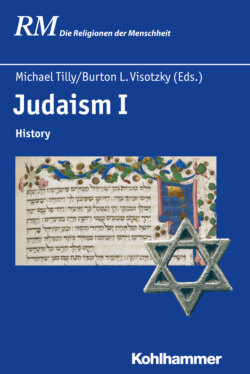Читать книгу Judaism I - Группа авторов - Страница 61
На сайте Литреса книга снята с продажи.
Atonement for the land84
ОглавлениеThe key text for the self-understanding of the community, the Yahad, which lies behind the Community Rule, 1QS (including the fragments from Cave 4), is »to atone for the land.«85
In the context of 1QS 8.1–10 the expression occurs twice:
(1) In the council of the Yahad there shall be twelve men and three priests, perfect in everything that is revealed from the whole (2) Torah, to do truth and justice and right judgment and compassionate love and a humble walking, each one with his neighbor, (3) to maintain faithfulness in the land with a firm purpose and a broken spirit and to atone for sin by doing justly, (4) and (to bear) affliction and to walk with everything according to the measure of truth and the regulation of time. When this happens in Israel, (5) the council of the Yahad stands firm in truth as an eternal planting, a holy house for Israel and a foundation of a holy of holies (6) for Aaron, witnesses for right judgment and chosen ones of (God’s) goodwill, to atone for the land and to render retribution to the wicked. This is the proven wall, the precious cornerstone, (8) whose foundations do not waver or tremble in their place. A most holy dwelling (9) for Aaron in all knowledge, for a covenant of justice, and in order to bring a sweet-smelling sacrifice, and a house of perfection and truth in Israel, (10) to establish a covenant in accordance with the everlasting laws. And they are agreable, to atone for the land86 and to establish judgment on iniquity; and there shall be no more iniquity.87
As temple, the community took over the atonement function that the sacrifices had in the Jerusalem Temple: the community saw itself as the temple. It performed its function of atonement in perfect behavior and in praise. In one extraordinary phrase there is even talk of »a temple (consisting) of people« (4Q174 1–2 I 6). The idea that worship can take the place of sacrifices in the temple is expressed in cultic language, which speaks of a »heave offering of the lips« (1QS 9.4; 10.6, 14).
1QS 9.3–6:
(3) When these things occur in Israel in accordance with all these provisions, (these men) become a foundation of the Holy Spirit in (4) eternal truth, to atone for wickedness and the sin of apostasy and for goodwill for the land, without the flesh of burnt offerings and without the fat of animal sacrifices, for a heave offering (5) of the lips in accordance with the decree is like a just appeasement and a perfect way (derekh) is like a pleasing freewill offering. At this time the men of the Yahad are to set themselves apart (6) as a holy house for Aaron to unite as a holy of holies and a house of Yahad for Israel, of those that walk perfectly.88
The petitioner vows to present his »offering of the lips« at all prayer times during feasts and during the day (1QS 10.6, 14).
The 15 men of 1QS 8.1 are also found in 4Q265,89 which displays a remarkable variety of themes and literary genres in fragment 7. Of these, Joseph Baumgarten notes: orders for the Sabbath, prohibition of priests performing sprinklings on the Sabbath, permission to walk two thousand cubits on the Sabbath for pasturing animals, the eschatological council of the Yahad, Adam and Eve in paradise, and purification after birth.90 The important passage in the present context is found in lines 7–9 of fragment 7:
(7) [When] there will be the council of the Yahad fif[teen men, as God foretold through his servants, the pr]ophets, the Council of the Yaha[d ] will be established [in truth as an eternal plant, truthful witnesses, and chosen by] (divine) will, and sweet odour to atone for the [l]and, an off[ering (?) (10) and the periods of deceit will come to an end by judgment and the [...].
Here too, as in 1QS 8.1–10, we find the atoning function of the Yahad with its core of twelve laymen and three priests. The number fifteen in 4Q265 fragm 7.7 looks like a quotation from 1QS 8.1.
